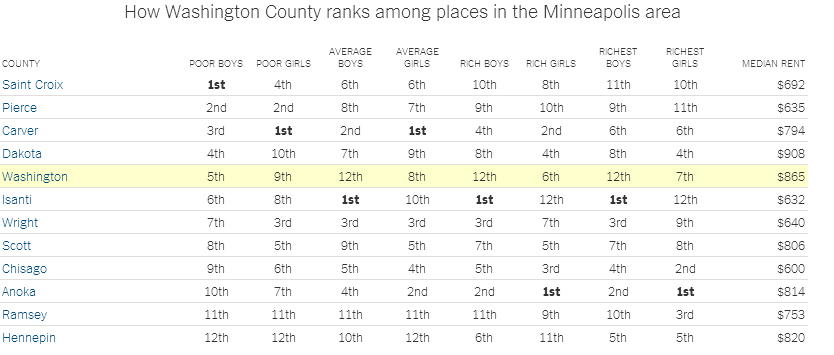It’s hard to run a race when you’re not allowed to start at the same point as others in the race.
That’s the upshot of a New York Times story today that reveals the extent to which one’s lot in life is luck — the randomness of where someone is born and raised.
The study from researchers Raj Chetty and Nathaniel Hendren goes beyond previous research showing the relationship between geography and poverty. It shows that geography causes poverty.
Those who are upwardly mobile grow up in areas with less segregation by income and race, lower levels of income inequality, better schools, lower rates of violent crime, and a larger share of two-parent households.
The Times tailors its story to the reader, providing local data based on where it believes you’re reading it.
In my case, it’s Washington County.
It’s among the best counties in the U.S. in helping poor children up the income ladder. It ranks 2,200th out of 2,478 counties, better than about 89 percent of counties. It ranks better for poor children than it does for rich children.
Location matters – enormously. If you’re poor and live in the Minneapolis area, it’s better to be in Carver County than in Ramsey County or Hennepin County. Not only that, the younger you are when you move to Carver, the better you will do on average.
Every year a poor child spends in Carver County adds about $270 to his or her annual household income at age 26, compared with a childhood spent in the average American county. Over the course of a full childhood, which is up to age 20 for the purposes of this analysis, the difference adds up to about $5,400, or 21 percent, more in average income as a young adult.

By comparison, a kid growing up in Beltrami County would make about 3 percent on average less per year by age 26. In Minnesota’s farm country, however, a person would make about 25 percent more on average.
The study would appear to prove the philosophy of the Metropolitan Council, which is trying to push affordable housing options into the suburbs as a way to combat a concentration of poverty.
Some economists who have seen the new study say that it argues for a new approach to housing policy. Current policy often forces the parents of young children onto waiting lists for housing vouchers.
It also gives tax incentives to developers who build in poor neighborhoods, rather than rewarding those who build affordable housing in areas that seem to offer better environments.
“The data shows we can do something about upward mobility,” said Chetty. “Every extra year of childhood spent in a better neighborhood seems to matter.”
Related: Where Poor Kids Grow Up Makes A Huge Difference (NPR).
